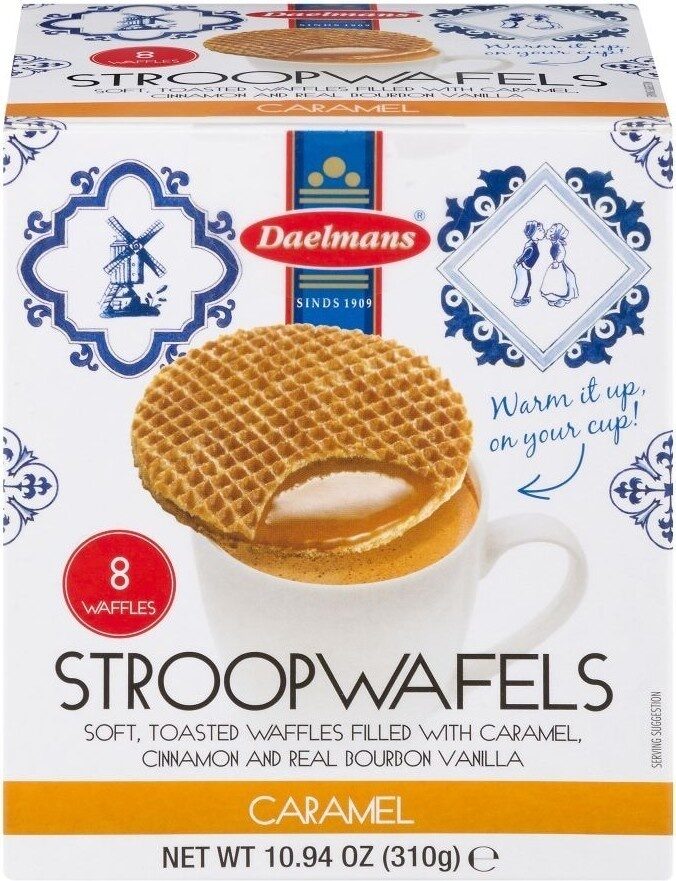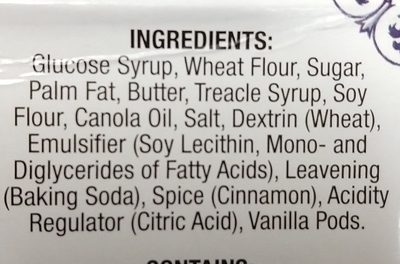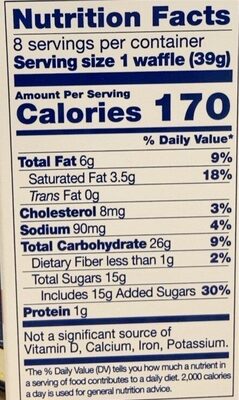Help us make food transparency the norm!
As a non-profit organization, we depend on your donations to continue informing consumers around the world about what they eat.
The food revolution starts with you!
Stroopwafels - Daelmans Banket B.V.
Stroopwafels - Daelmans Banket B.V.
This product page is not complete. You can help to complete it by editing it and adding more data from the photos we have, or by taking more photos using the app for Android or iPhone/iPad. Thank you!
×
Barcode: 0853754003342 (EAN / EAN-13) 853754003342 (UPC / UPC-A)
Brands: Daelmans Banket B.V.
Brand owner: The Brand Passport, Inc.
Categories: Snacks, Sweet snacks, Biscuits and cakes, Biscuits, Pastries, Wafers, Stuffed wafers, Waffles, Caramel stuffed wafers
Labels, certifications, awards:
Sustainable, Vegetarian, Sustainable Palm Oil, Roundtable on Sustainable Palm Oil
Traceability code: RSPO-1106199
Countries where sold: France, United States
Matching with your preferences
Health
Ingredients
-
18 ingredients
glucose syrup, wheat flour, butter (cream), sugar, palm oil, treacle syrup, canola oil, soy flour, salt, soy lecithin, sodium acid pyrophosphate, baking soda, cinnamon, vanilla pods, eggs, mono - and diglycerides, citric acidAllergens: Eggs, Gluten, Milk, Soybeans
Food processing
-
Ultra processed foods
Elements that indicate the product is in the 4 - Ultra processed food and drink products group:
- Additive: E322 - Lecithins
- Additive: E450 - Diphosphates
- Additive: E471 - Mono- and diglycerides of fatty acids
- Ingredient: Glucose
- Ingredient: Glucose syrup
- Ingredient: Invert sugar
Food products are classified into 4 groups according to their degree of processing:
- Unprocessed or minimally processed foods
- Processed culinary ingredients
- Processed foods
- Ultra processed foods
The determination of the group is based on the category of the product and on the ingredients it contains.
Additives
-
E322 - Lecithins
Lecithins are natural compounds commonly used in the food industry as emulsifiers and stabilizers.
Extracted from sources like soybeans and eggs, lecithins consist of phospholipids that enhance the mixing of oil and water, ensuring smooth textures in various products like chocolates, dressings, and baked goods.
They do not present any known health risks.
-
E322i - Lecithin
Lecithins are natural compounds commonly used in the food industry as emulsifiers and stabilizers.
Extracted from sources like soybeans and eggs, lecithins consist of phospholipids that enhance the mixing of oil and water, ensuring smooth textures in various products like chocolates, dressings, and baked goods.
They do not present any known health risks.
-
E330 - Citric acid
Citric acid is a natural organic acid found in citrus fruits such as lemons, oranges, and limes.
It is widely used in the food industry as a flavor enhancer, acidulant, and preservative due to its tart and refreshing taste.
Citric acid is safe for consumption when used in moderation and is considered a generally recognized as safe (GRAS) food additive by regulatory agencies worldwide.
-
E450 - Diphosphates
Diphosphates (E450) are food additives often utilized to modify the texture of products, acting as leavening agents in baking and preventing the coagulation of canned food.
These salts can stabilize whipped cream and are also found in powdered products to maintain their flow properties. They are commonly present in baked goods, processed meats, and soft drinks.
Derived from phosphoric acid, they're part of our daily phosphate intake, which often surpasses recommended levels due to the prevalence of phosphates in processed foods and drinks.
Excessive phosphate consumption is linked to health issues, such as impaired kidney function and weakened bone health. Though diphosphates are generally regarded as safe when consumed within established acceptable daily intakes, it's imperative to monitor overall phosphate consumption to maintain optimal health.
-
E471 - Mono- and diglycerides of fatty acids
Mono- and diglycerides of fatty acids (E471), are food additives commonly used as emulsifiers in various processed foods.
These compounds consist of glycerol molecules linked to one or two fatty acid chains, which help stabilize and blend water and oil-based ingredients. E471 enhances the texture and shelf life of products like margarine, baked goods, and ice cream, ensuring a smooth and consistent texture.
It is generally considered safe for consumption within established regulatory limits.
-
E500 - Sodium carbonates
Sodium carbonates (E500) are compounds commonly used in food preparation as leavening agents, helping baked goods rise by releasing carbon dioxide when they interact with acids.
Often found in baking soda, they regulate the pH of food, preventing it from becoming too acidic or too alkaline. In the culinary world, sodium carbonates can also enhance the texture and structure of foods, such as noodles, by modifying the gluten network.
Generally recognized as safe, sodium carbonates are non-toxic when consumed in typical amounts found in food.
-
E500ii - Sodium hydrogen carbonate
Sodium hydrogen carbonate, also known as E500ii, is a food additive commonly used as a leavening agent.
When added to recipes, it releases carbon dioxide gas upon exposure to heat or acids, causing dough to rise and resulting in a light, fluffy texture in baked goods.
It is generally recognized as safe (GRAS) by regulatory authorities when used in appropriate quantities and poses no significant health risks when consumed in typical food applications.
Ingredients analysis
-
Palm oil
Ingredients that contain palm oil: Palm oil
-
Non-vegan
Non-vegan ingredients: Butter, Cream, Egg
-
Vegetarian
No non-vegetarian ingredients detected
-
Details of the analysis of the ingredients
en: glucose syrup, wheat flour, butter (cream), sugar, palm oil, treacle, canola oil, soy flour, salt, soy lecithin, sodium acid pyrophosphate, baking soda, cinnamon, vanilla pods, eggs, mono- and diglycerides, citric acid- glucose syrup -> en:glucose-syrup - vegan: yes - vegetarian: yes - ciqual_proxy_food_code: 31016 - percent_min: 5.88235294117647 - percent_max: 100
- wheat flour -> en:wheat-flour - vegan: yes - vegetarian: yes - ciqual_proxy_food_code: 9410 - percent_min: 0 - percent_max: 50
- butter -> en:butter - vegan: no - vegetarian: yes - ciqual_proxy_food_code: 16400 - percent_min: 0 - percent_max: 33.3333333333333
- cream -> en:cream - vegan: no - vegetarian: yes - ciqual_food_code: 19402 - percent_min: 0 - percent_max: 33.3333333333333
- sugar -> en:sugar - vegan: yes - vegetarian: yes - ciqual_proxy_food_code: 31016 - percent_min: 0 - percent_max: 25
- palm oil -> en:palm-oil - vegan: yes - vegetarian: yes - from_palm_oil: yes - ciqual_food_code: 16129 - percent_min: 0 - percent_max: 20
- treacle -> en:golden-syrup - vegan: yes - vegetarian: yes - percent_min: 0 - percent_max: 16.6666666666667
- canola oil -> en:canola-oil - vegan: yes - vegetarian: yes - from_palm_oil: no - percent_min: 0 - percent_max: 14.2857142857143
- soy flour -> en:soya-flour - vegan: yes - vegetarian: yes - ciqual_food_code: 20900 - percent_min: 0 - percent_max: 12.5
- salt -> en:salt - vegan: yes - vegetarian: yes - ciqual_food_code: 11058 - percent_min: 0 - percent_max: 0.57692307692307
- soy lecithin -> en:soya-lecithin - vegan: yes - vegetarian: yes - ciqual_food_code: 42200 - percent_min: 0 - percent_max: 0.57692307692307
- sodium acid pyrophosphate -> en:e450i - vegan: yes - vegetarian: yes - percent_min: 0 - percent_max: 0.57692307692307
- baking soda -> en:e500ii - vegan: yes - vegetarian: yes - percent_min: 0 - percent_max: 0.57692307692307
- cinnamon -> en:cinnamon - vegan: yes - vegetarian: yes - percent_min: 0 - percent_max: 0.57692307692307
- vanilla pods -> en:vanilla-pod - vegan: yes - vegetarian: yes - percent_min: 0 - percent_max: 0.57692307692307
- eggs -> en:egg - vegan: no - vegetarian: yes - ciqual_food_code: 22000 - percent_min: 0 - percent_max: 0.57692307692307
- mono- and diglycerides -> en:e471 - vegan: maybe - vegetarian: maybe - from_palm_oil: maybe - percent_min: 0 - percent_max: 0.57692307692307
- citric acid -> en:e330 - vegan: yes - vegetarian: yes - percent_min: 0 - percent_max: 0.57692307692307
Nutrition
-
Bad nutritional quality
⚠ ️Warning: the amount of fruits, vegetables and nuts is not specified on the label, it was estimated from the list of ingredients: 0This product is not considered a beverage for the calculation of the Nutri-Score.
Positive points: 2
- Proteins: 1 / 5 (value: 2.5641025641026, rounded value: 2.56)
- Fiber: 2 / 5 (value: 2.5641025641026, rounded value: 2.56)
- Fruits, vegetables, nuts, and colza/walnut/olive oils: 0 / 5 (value: 0.735294117647058, rounded value: 0.7)
Negative points: 23
- Energy: 5 / 10 (value: 1824, rounded value: 1824)
- Sugars: 8 / 10 (value: 38.461538461538, rounded value: 38.46)
- Saturated fat: 8 / 10 (value: 8.974358974359, rounded value: 9)
- Sodium: 2 / 10 (value: 230.769230769228, rounded value: 230.8)
The points for proteins are not counted because the negative points are greater or equal to 11.
Nutritional score: (23 - 2)
Nutri-Score:
-
Nutrient levels
-
Fat in moderate quantity (15.4%)
What you need to know- A high consumption of fat, especially saturated fats, can raise cholesterol, which increases the risk of heart diseases.
Recommendation: Limit the consumption of fat and saturated fat- Choose products with lower fat and saturated fat content.
-
Saturated fat in high quantity (8.97%)
What you need to know- A high consumption of fat, especially saturated fats, can raise cholesterol, which increases the risk of heart diseases.
Recommendation: Limit the consumption of fat and saturated fat- Choose products with lower fat and saturated fat content.
-
Sugars in high quantity (38.5%)
What you need to know- A high consumption of sugar can cause weight gain and tooth decay. It also augments the risk of type 2 diabetes and cardio-vascular diseases.
Recommendation: Limit the consumption of sugar and sugary drinks- Sugary drinks (such as sodas, fruit beverages, and fruit juices and nectars) should be limited as much as possible (no more than 1 glass a day).
- Choose products with lower sugar content and reduce the consumption of products with added sugars.
-
Salt in moderate quantity (0.577%)
What you need to know- A high consumption of salt (or sodium) can cause raised blood pressure, which can increase the risk of heart disease and stroke.
- Many people who have high blood pressure do not know it, as there are often no symptoms.
- Most people consume too much salt (on average 9 to 12 grams per day), around twice the recommended maximum level of intake.
Recommendation: Limit the consumption of salt and salted food- Reduce the quantity of salt used when cooking, and don't salt again at the table.
- Limit the consumption of salty snacks and choose products with lower salt content.
-
-
Nutrition facts
Nutrition facts As sold
for 100 g / 100 mlAs sold
per serving (1 WAFFLE (39 g))Compared to: Caramel stuffed wafers Energy 1,824 kj
(435 kcal)711 kj
(170 kcal)-2% Fat 15.385 g 6 g -19% Saturated fat 8.974 g 3.5 g -11% Trans fat 0 g 0 g -100% Cholesterol 38 mg 14.8 mg +63% Salt 0.577 g 0.225 g +1% Carbohydrates 66.667 g 26 g +3% Fiber 2.564 g 1 g +70% Sugars 38.462 g 15 g +8% Proteins 2.564 g 1 g -19% Vitamin A 0 µg 0 µg Vitamin C (ascorbic acid) 0 mg 0 mg Calcium 0 mg 0 mg -100% Iron 1.85 mg 0.722 mg +16% Fruits‚ vegetables‚ nuts and rapeseed‚ walnut and olive oils (estimate from ingredients list analysis) 0.735 % 0.735 %
Environment
-
Eco-Score C - Moderate environmental impact
The Eco-Score is an experimental score that summarizes the environmental impacts of food products.→ The Eco-Score was initially developped for France and it is being extended to other European countries. The Eco-Score formula is subject to change as it is regularly improved to make it more precise and better suited to each country.Life cycle analysis
-
Average impact of products of the same category: B (Score: 77/100)
Category: Wafer biscuit, crunchy (thin or dry), plain or with sugar, prepacked
Category: Wafer biscuit, crunchy (thin or dry), plain or with sugar, prepacked
- PEF environmental score: 0.30 (the lower the score, the lower the impact)
- including impact on climate change: 2.47 kg CO2 eq/kg of product
Stage Impact Agriculture
75.8 %Processing
12.6 %Packaging
6.4 %Transportation
3.6 %Distribution
1.6 %Consumption
0.0 %
Bonuses and maluses
-
Missing origins of ingredients information
Malus: -5
⚠ ️ The origins of the ingredients of this product are not indicated.
If they are indicated on the packaging, you can modify the product sheet and add them.
If you are the manufacturer of this product, you can send us the information with our free platform for producers.
-
Missing packaging information for this product
Malus: -15
⚠ ️ The information about the packaging of this product is not filled in.⚠ ️ For a more precise calculation of the Eco-Score, you can modify the product page and add them.
If you are the manufacturer of this product, you can send us the information with our free platform for producers.
Eco-Score for this product
-
Impact for this product: C (Score: 57/100)
Product: Stroopwafels - Daelmans Banket B.V.
Life cycle analysis score: 77
Sum of bonuses and maluses: -20
Final score: 57/100
-
Carbon footprint
-
Equal to driving 1.3 km in a petrol car
247 g CO² per 100g of product
The carbon emission figure comes from ADEME's Agribalyse database, for the category: Wafer biscuit, crunchy (thin or dry), plain or with sugar, prepacked (Source: ADEME Agribalyse Database)
Stage Impact Agriculture
74.3 %Processing
7.9 %Packaging
11.7 %Transportation
5.3 %Distribution
0.8 %Consumption
0.0 %
Packaging
-
Missing packaging information for this product
⚠ ️ The information about the packaging of this product is not filled in.Take a photo of the recycling information Take a photo of the recycling information
Transportation
-
Origins of ingredients
Missing origins of ingredients information
⚠ ️ The origins of the ingredients of this product are not indicated.
If they are indicated on the packaging, you can modify the product sheet and add them.
If you are the manufacturer of this product, you can send us the information with our free platform for producers.Add the origins of ingredients for this product Add the origins of ingredients for this product
Report a problem
-
Incomplete or incorrect information?
Category, labels, ingredients, allergens, nutritional information, photos etc.
If the information does not match the information on the packaging, please complete or correct it. Open Food Facts is a collaborative database, and every contribution is useful for all.
Data sources
Product added on by usda-ndb-import
Last edit of product page on by isshan.
Product page also edited by gnat, inf, kiliweb, openfoodfacts-contributors, org-database-usda, roboto-app, yogoff, yuka.RzdBNE5KVUNvOUlydnNJRy94N2s4NDl3eUoySFQwRzdHdkFUSVE9PQ, yuka.sY2b0xO6T85zoF3NwEKvlk1FDeqOoTeda0LigXyn7Muxf6XYeMt8-brIMag.










